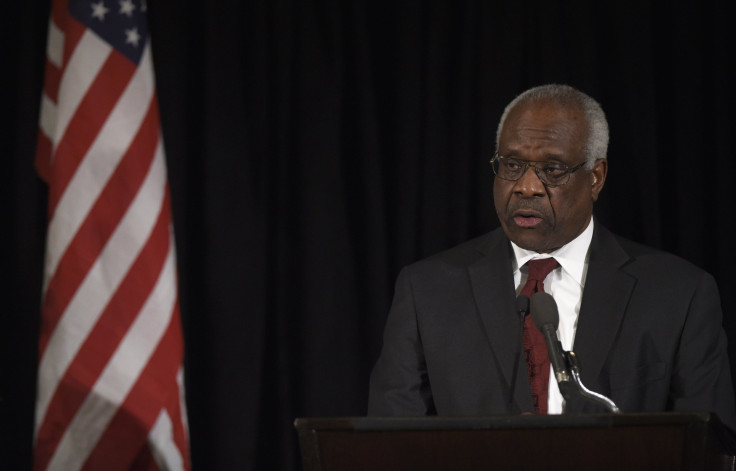Clarence Thomas Groping Scandal Explained: What To Know About Anita Hill, Moira Smith And His Supreme Court Confirmation

Anita Hill, who famously accused Supreme Court Justice Clarence Thomas of sexual harassment in the '90s, came to the defense of a new Thomas accuser this week. In an article published Thursday in the National Law Journal, Hill demanded a "fair" probe into Alaska lawyer Moira Smith's allegation that Thomas groped her at a 1999 dinner.
Given that a third of the American electorate belongs to the millennial generation, which was young or not yet born during Thomas' controversial confirmation hearing 25 years ago, many learning of the Smith news might not know Hill's story and how it applies to Smith's case.
Here's some background on the Thomas accusations.
Who are we talking about? These days, Thomas is the second African-American to serve as a justice on the United States Supreme Court. But before he was nominated, he worked in the Education Department and Equal Employment Opportunity Commission alongside his assistant, Hill.
What happened? Hill, an African-American law professor at the University of Oklahoma College of Law, spoke up against her former boss when then-President George H. W. Bush selected Thomas to replace Thurgood Marshall, the first African-American justice, in 1991. At Thomas' Senate confirmation hearing, Hill alleged that Thomas repeatedly asked her on dates and spoke about sex despite her rejections.
"He spoke about acts that he had seen in pornographic films involving such matters as women having sex with animals and films showing group sex or rape scenes," Hill testified, according to a transcript. "He talked about pornographic materials depicting individuals with large penises or large breasts involved in various sex acts."
Hill went on to say that Thomas continually brought up his genitals and, at one point, remarked that there was pubic hair on a Coca-Cola can in the office. "He said that if I ever told anyone of his behavior that it would ruin his career," she said. "This was not an apology, nor was it an explanation."
How did Thomas respond? During the hearing, Thomas flatly denied the accusations. He said he did not do what Hill alleged and disliked people digging into his personal life as a result of her testimony.
"This is a circus. It’s a national disgrace," he said. "And from my standpoint, as a black American, it is a high-tech lynching for uppity blacks who in any way deign to think for themselves, to do for themselves, to have different ideas, and it is a message that unless you kowtow to an old order, this is what will happen to you."
What was the outcome? Thomas was confirmed by a 52-48 vote. Hill's story was immortalized in the HBO movie "Confirmation," which starred Kerry Washington and came out earlier this year.
Were there other accusers? Yes. Another woman, Angela Wright, was interviewed in connection with Thomas' hearing but did not testify. Wright alleged that Thomas had asked her out, as well, and once "commented on the dress I was wearing and asked me what size my boobs were," the Washington Post reported. Thomas later fired her.
Then, on Thursday, the National Law Journal published Smith's story. Smith claimed that at a 1999 dinner partyThomas "sort of cupped his hand around my butt" and "and gave me a squeeze." Smith said she was motivated to come forward because of a recently leaked tape of Republican presidential candidate Donald Trump inappropriately taking advantage of women.
"Donald Trump said when you're a star, they let you do it; you can do anything," Smith said. "The idea that we as victims let them do it made me mad."
Has Thomas responded? The Supreme Court rejected Smith's account in the National Law Journal. "This claim is preposterous and it never happened," CNN reported a spokesperson said.
© Copyright IBTimes 2024. All rights reserved.












